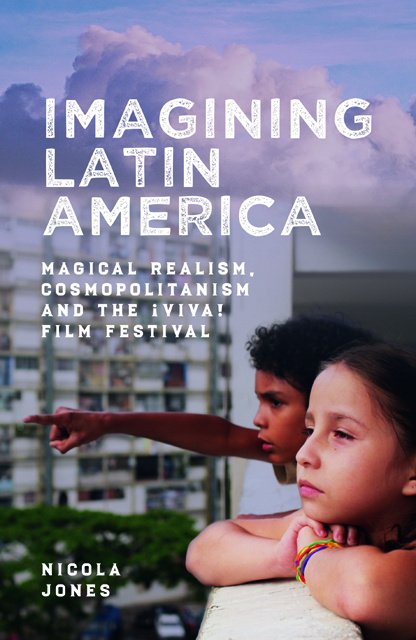Book contents
- Frontmatter
- Contents
- List of Illustrations
- Acknowledgements
- Introduction: Latin American Culture in the UK
- 1 British Identity, Cosmopolitan Anxieties and the Latin American Other
- 2 Latin America and Magical Realism in the British Press (1940–2015)
- 3 Cultural Consumption in Manchester
- 4 The Production of Latin America through ¡Viva!
- 5 Consuming Latin America through ¡Viva!
- Conclusion
- Appendix 1: Analysis of the British Press (1940–2015)
- Appendix 2: ¡Viva! Post-Screening Questionnaires and Interviews
- Bibliography
- Index
- Frontmatter
- Contents
- List of Illustrations
- Acknowledgements
- Introduction: Latin American Culture in the UK
- 1 British Identity, Cosmopolitan Anxieties and the Latin American Other
- 2 Latin America and Magical Realism in the British Press (1940–2015)
- 3 Cultural Consumption in Manchester
- 4 The Production of Latin America through ¡Viva!
- 5 Consuming Latin America through ¡Viva!
- Conclusion
- Appendix 1: Analysis of the British Press (1940–2015)
- Appendix 2: ¡Viva! Post-Screening Questionnaires and Interviews
- Bibliography
- Index
Summary
Latin America has gained a much larger cultural presence in the UK in recent decades, particularly in terms of cultural consumption. The introduction to this book began with the UK chart success of Despacito as an example of the unwavering interest in the Latin American amongst the British public, succeeding decades of increasing consumption of Latin American music, dance, food, sport, literature and film. This increase has occurred at a time when the UK is undergoing a perceived crisis in identity as a result of contemporary processes of globalisation. Since the 1990s, successive British governments have tried to accommodate higher levels of immigration within social policies of multiculturalism and community cohesion yet have struggled to reconcile increasing immigration with traditional notions of White British culture and identity. This has led to a growing discourse that the UK is losing its traditional culture and identity in the face of increasing cultural pluralism (Nagle, 2009, p. 92). Owing to these tensions, there has been an increase in rhetoric against immigrants and ethnic minorities within the UK and a growing concern regarding the future of British culture and identity. This book has examined one way in which contemporary consumers in Manchester are reconciling issues of cosmopolitanism and identity at a local level through their consumption of Latin American culture and ¡Viva!.
I have demonstrated how non-Latin American consumers are able to form a sense of connection with the Latin American Other through ¡Viva!. Building on Dina Iordanova’s (2010) application of imagined communities to film festivals and diaspora, I have extended her framework to include audiences beyond diaspora and demonstrated how, through ¡Viva!, Latin American culture can equally come to form part of the non-Latin American’s experiences and identity. Both post-screening questionnaire respondents and interviewees emphasised social and cultural differences between Latin America and the UK. However, interviewees such as Ian and Lee also identified a sense of commonality and shared values between themselves and the Latin American Other, values which they believed they cannot and do not share with wider British culture and society. Through participating in ¡Viva!, non-Latin American consumers were able to imagine themselves to be connected to people whom they perceived to share their beliefs, values and attitudes. Through identifying with the on-screen characters and bolstered by the very real sense of cosmopolitan community engendered by a foreign language film festival – one which here brings Latin Americans (and Spaniards) together with non-Hispanic consumers – non-Latin American audience members were able to imagine a shared connection with Latin American culture beyond the film festival screen. ¡Viva! thus created not merely a sense of imagined community, but rather a sense of imagined cosmopolitan community between the non-Latin American and the Latin American. Non-Latin American audience members were subsequently able to use this sense of connection to incorporate a Latin American identity within their notion of self-identity.
- Type
- Chapter
- Information
- Imagining Latin AmericaMagical Realism, Cosmopolitanism and the ¡Viva! Film Festival, pp. 173 - 180Publisher: Boydell & BrewerPrint publication year: 2021



